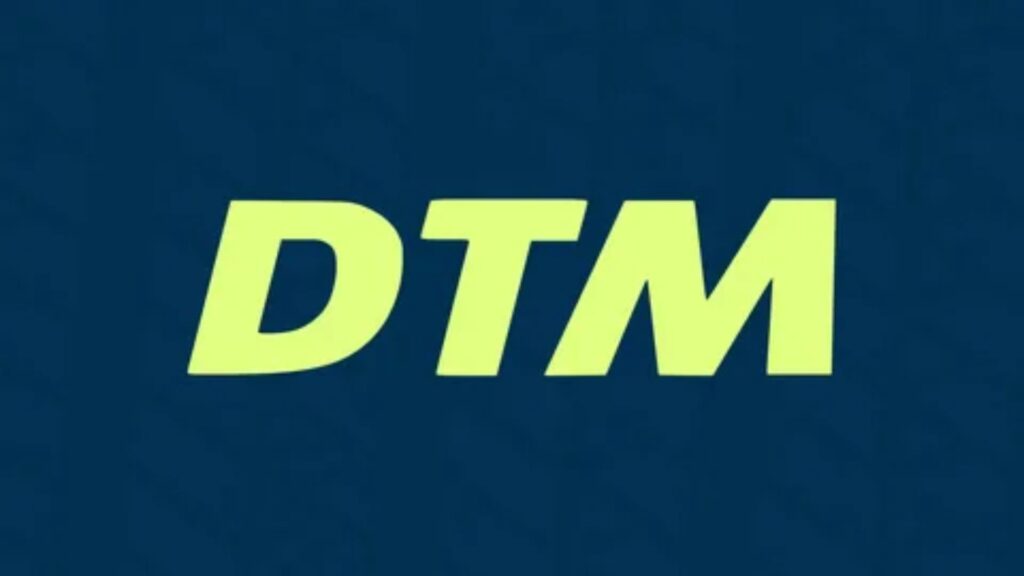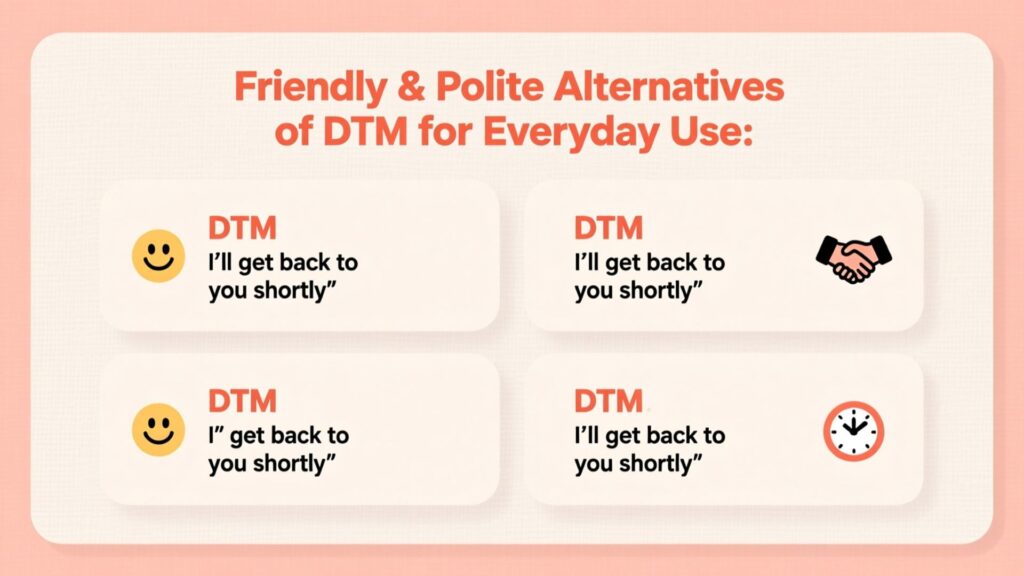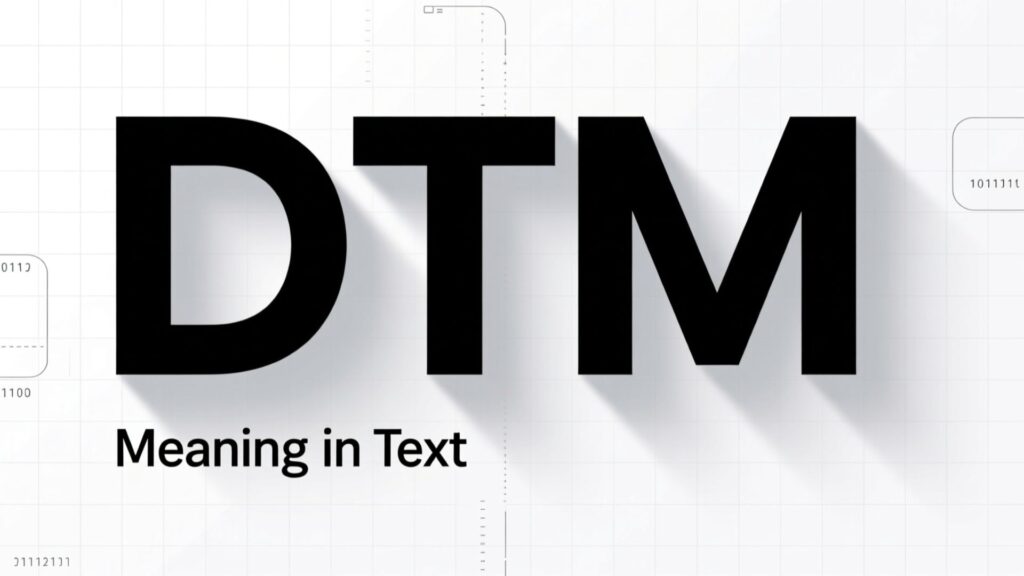Communication moves fast in the digital world. One moment you’re typing a message, the next you hit an acronym and wonder: “Wait
what does DTM mean in text?” If you’ve seen “DTM” in a chat, post, or caption and paused to figure it out you’re not alone. This article will walk you through dtm meaning in text, the different roles it plays, how tone and context affect it, and when you should (or shouldn’t) use it.
What Does “DTM” Mean in Text?

In short: the dtm meaning in text isn’t always one fixed thing. Depending on who uses it, where, and why it can shift.
Common definitions
Here are the major meanings of “DTM” in messaging and social media:
- “Doing Too Much” – Used when someone is perceived as overdoing something: going above and beyond (often unnecessarily) in attitude, effort or drama.
- “Down To Meet” – Less common, used when someone is asking if you’re available to hang out or meet up.
- Occasionally, it can mean “Dead To Me” (used when someone declares they no longer consider someone else), though this use is less frequent.
Meaning by context
| Meaning | Typical Context | Example |
|---|---|---|
| Doing Too Much | Teasing, critique of behavior | “Dude, you’re totally DTM with that post.” |
| Down To Meet | Making plans, social hangouts | “Hey are you DTM for lunch at 3?” |
| Dead To Me | Extreme distancing, drama in relationships | “After that betrayal, she’s DTM for me.” |
Because the meaning can differ, it’s important to read the room tone, relationship, and platform all matter.
Origins and Evolution of “DTM”
Slang evolves fast. Here’s a quick look at how “DTM” developed and where it sits now.
- The use of “DTM” as doing too much is found in slang dictionaries dating back to around 2017.
- Over time, it picked up other interpretations like down to meet and dead to me, as users adapted the letters to different messages.
- In 2024–2025, with platforms like TikTok, Instagram Stories, Snapchat, and group chats dominating, acronyms like “DTM” have become part of everyday digital expression.
- What started as casual teen slang now sees usage across age groups, though understanding still depends heavily on context.
“DTM” in Real Conversations Examples That Clarify the Context
Let’s look at actual examples to see what does dtm mean when used in real chats.
“Bro, posting three selfies in a row is kinda DTM rn.”
Here “DTM” = doing too much.
“I’m so over her lies. She’s officially DTM for me.”
Here “DTM” = dead to me.
“We’re meeting Saturday you DTM for 7pm at the café?”
Here “DTM” = down to meet.
These variations show how tone and relationship change the meaning what’s playful with friends might feel harsh in a professional chat.
Is “DTM” Polite, Playful, or Rude? (Tone Decoded)
When you use “DTM” you’re not just using the letters you’re setting a tone.
How tone affects “DTM”
- If someone says “You’re being DTM” with a friendly laugh emoji, it’s playful teasing about being extra.
- If someone says “You’re DTM” bluntly in a serious conversation, it might feel critical or even rude.
- If used when distancing (“She’s DTM for me”), it can carry hurt or finality.
Tone indicators to watch for
- Emojis: 😅 🤦♂️ 😒 → lighter tone; 😤 😡 → stronger tone
- Punctuation: “You’re DTM…” vs “YOU are DTM!”
- Relationship: Close friend vs coworker vs acquaintance
- Platform: Private DM vs public post vs work email
Understanding these cues helps you interpret or use “DTM” in a way that fits your intent.
When to Use or Avoid “DTM”
Knowing when to use or avoid “DTM” is as important as knowing what it means.
✅ Use it when:
- You’re chatting casually with friends who understand your slang.
- You want to lightly tease someone about being over-the-top.
- You’re on social media where informal language is expected.
❌ Avoid it when:
- You’re in a professional or formal context (e.g., emails, LinkedIn posts).
- The person you’re talking to might misread your tone.
- The relationship is delicate and you don’t want to risk causing offense.
In other words: use “DTM” when the vibe suits it. Skip it when clarity and caution matter.
Professional Alternatives to “DTM”
In formal or work-related settings you’ll want to replace “DTM” with phrases that convey your meaning politely.
Table of alternatives
| Original “DTM” meaning | Professional replacement |
|---|---|
| You’re being DTM | “That feels a bit excessive.” |
| They’re DTM for me | “I’m no longer comfortable with this behavior.” |
| Want to meet? DTM at X | “Are you available for a meeting at X?” |
Using a full, clear phrase helps avoid misinterpretation and maintains professionalism.
Friendly & Polite Alternatives for Everyday Use

When you’re with friends or texting casually but want to be a bit gentler than “DTM”, here are softer alternatives:
Casual & Playful
- “You’re doing the most today 😄”
- “Okay, we get it you’re extra!”
- “Chill out a bit, you’re wild.”
Gentle & Supportive
- “Maybe that’s a little too much right now.”
- “Let’s dial it back a notch.”
- “I know you’re excited just something to watch.”
Polite & Professional
- “Let’s keep things balanced.”
- “Perhaps we’re going overboard here.”
- “We might want to tone things down.”
Choosing the right phrase helps maintain friendship, clarity, and goodwill.
Real-World Scenarios: How to Replace “DTM” Smartly
Here are common messaging situations and how to phrase your thoughts without relying on slang.
🗨️ In Text Messages
Before: “You’re so DTM with that outfit.”
After: “You really went all out for that look!”
🗨️ In Group Chats
Before: “Bro, calm down you’re DTM.”
After: “Let’s take a step back on this topic, we might be overthinking.”
🗨️ In Work Messages or Emails
Before: “The proposal is DTM and needs simplification.”
After: “The proposal has many elements; I’d suggest simplifying to increase clarity.”
🗨️ In Relationship Conflicts
Before: “You’re DTM and I can’t deal anymore.”
After: “I feel overwhelmed by your reaction; we should talk about this calmly.”
Each scenario shows how you can convey the same core idea someone’s being excessive or overwhelming but in a way suited to your audience.
“DTM” in Pop Culture and Online Trends
Digital culture drives slang. The term dtm meaning slang has found its way into memes, captions, and social media captions.
- On TikTok and Instagram, you’ll find posts captioned “When you show up in heels at the BBQ DTM 😏”.
- On Twitter, users might tweet “She’s DTM for the awards night #overkill”.
- Meme creators use “DTM” to label dramatic, extra, or hilarious behavior.
These uses help “DTM” stay relevant but also fluid and varied in meaning.
Understanding the Nuance: Why Word Choice Shapes Tone
Choosing the right words affects how your message lands. Using “DTM” or an alternative isn’t just vocabulary it’s tone, emotion, and intent.
- A short phrase like “You’re DTM” can feel sharp if the receiver doesn’t share your slang.
- Replacing it with “I feel you’re going overboard” softens the message and invites dialogue.
- In digital communication especially, tone gets lost easily acronyms amplify that risk.
Example: Two friends texting:
- Friend A: “Stop being DTM 😂” playful if both know each other well.
- Friend B (not familiar): “What are you talking about?” confusion or even offense.
Understanding and choosing your word matters.
Quick Reference: “DTM” Cheat Sheet
Here’s a handy table you can skim anytime you encounter “DTM” or wonder how to use it.
| Text/Chat | Meaning | Tone | Best Use-Case |
|---|---|---|---|
| “You’re DTM” | Doing Too Much | Playful/critical | Casual chat with friends |
| “Are you DTM at 8?” | Down To Meet | Inviting | Planning a meetup |
| “They’re DTM for me” | Dead To Me | Final/serious | Relationship/drama context |
Conclusion: Expressing “DTM” Without Losing Your Voice
Now you know what DTM means in text how it can mean doing too much, down to meet, or even dead to me. You’ve seen how context, tone, and relationship change the meaning. You’ve learned when to use it, when to avoid it, and how to offer alternatives that keep your voice clear and kind.
Remember: Use slang like “DTM” when it fits the moment. If in doubt go with a clear phrase. That way you stay authentic, avoid confusion, and keep your digital communication smooth.
Next time you see “DTM” in a message or want to use it yourself you’ll know exactly what it means and how to use it well.
Bugti is the founder of Quoethint.com, a hub for English language tips, writing advice, and grammar guidance. With years of experience in English studies and a passion for clear communication, Bugti created this platform to make grammar and writing easy to understand for everyone.
